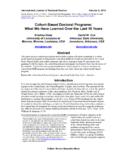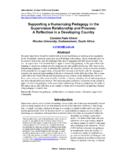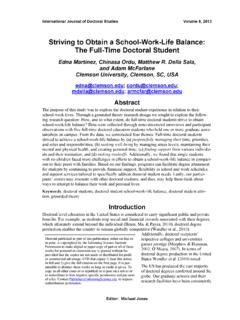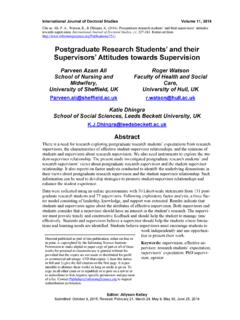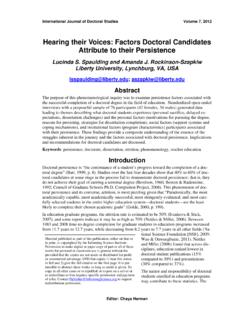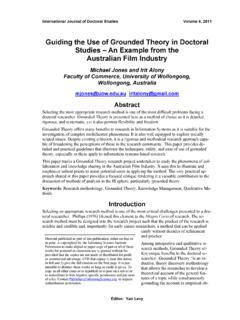Transcription of Using Interpretive Qualitative Case Studies for ...
1 International Journal of Doctoral Studies Volume 10, 2015. Cite as: Ponelis, S. R. (2015). Using Interpretive Qualitative case Studies for exploratory research in doctoral Studies : A. case of Information Systems research in small and medium enterprises. International Journal of Doctoral Studies , 10, 535-550. Retrieved from Using Interpretive Qualitative case Studies for Exploratory Research in Doctoral Studies : A case of Information Systems Research in Small and Medium Enterprises Shana R. Ponelis University of Wisconsin-Milwaukee, Milwaukee, WI, USA.
2 Abstract The use of the case study method has gained mainstream acceptance in both entrepreneurship and information systems research to develop conceptual and theoretical models that are novel, yet grounded in the literature. In spite of many texts on the case study method and the growing ac- ceptance and use of thereof, there are relatively few examples that discuss how to apply the case study method. The purpose of this paper is to provide such an example by drawing upon the au- thor's research for her doctoral dissertation in the discipline of information systems and entrepre- neurship research.
3 First, the use of Qualitative case Studies as research method is motivated, then the importance of the research paradigm is discussed and the interpretivist research paradigm jus- tified followed by a detailed discussion of the research design. The paper concludes with a dis- cussion of lessons learned and recommendations based on the author's experience with Using the case study method. The practical yet theoretically founded approach of this paper may be useful to doctoral students who are considering or Using the case study method. Equally, supervisors and others involved in research training may find this paper useful as an illustrative example of the case study method for their students.
4 Keywords: case study method, Qualitative methods, Interpretive research paradigm, exploratory research, theory building, semi-structured interviews, information systems, IS, entrepreneurship, small and medium enterprises, SMEs. Introduction The case study method can be used as both a teaching method and a research strategy. As a teach- ing method it simulates real-life situations in the classroom for discussion and debate or for case - based assignments. As a research strategy case Studies are used in a variety of contexts and disci- plines, for example, in organizations in Material published as part of this publication, either on-line or marketing and information systems (IS).
5 In print, is copyrighted by the Informing Science Institute. in small communities, households, Permission to make digital or paper copy of part or all of these families in psychology and social work;. works for personal or classroom use is granted without fee provided that the copies are not made or distributed for profit or or in countries, nations or regions in commercial advantage AND that copies 1) bear this notice in political science (Davies, 2007; Mou- full and 2) give the full citation on the first page. It is permissi- ton, 2001). The purpose of such case ble to abstract these works so long as credit is given.
6 To copy in Studies is to provide an intensive, holis- all other cases or to republish or to post on a server or to redis- tic description and analysis of a single, tribute to lists requires specific permission and payment of a fee. Contact to request redistribu- bounded unit situated in a specific con- tion permission. text to provide insight into real-life situ- Editor: Michael Jones Submitted: March 19, 2014; Revised: December 11, 2015; Accepted: December 16, 2015. Using Interpretive Qualitative case Studies ations (Merriam, 2009; Pickard, 2013).
7 The case study method is a popular research method that is particularly appealing for applied disciplines since processes, problems, and/or programs can be studied to engender understanding that can improve practice. Using a case study approach in research has several strengths including the ability to use a variety of research methods (Davies, 2007), the ability to establish rapport with research subjects (Mouton, 2001), to obtain sufficiently rich description that can be transferred to similar situations (Merriam, 2009) and, ultimately, in- depth insight.
8 In spite of, or perhaps because of, the popularity and the multitude of publications on the case study method this author struggled to translate the theory to practice in her doctoral research, an experience that is not uncommon amongst doctoral students who want specific examples of how to do it (Walsham, 2006, p. 321). This paper aims to provide a specific example for doctoral re- searchers that illustrates how to provide adequate philosophical grounding and theoretical justifi- cation for Using case Studies as research method by drawing upon the author's doctoral disserta- tion reporting on an exploratory study of an emerging technology, business intelligence, to meet information needs and support decision-making in small and medium enterprises in South Africa (Ponelis, 2011).
9 The next section provides a brief overview of the research project in order to contextualize the discussion in the subsequent sections. Thereafter the importance and choice of a research paradigm is discussed as well as the criteria used for assessing research. This section is followed by the rationale for Using the case study method within the chosen paradigm. Thereafter the research design is explained and the paper concludes with lessons learned and recommenda- tions with respect to the use of case Studies as a research method. The Project It is vital for SMEs to take a strategic approach to their information needs if they wish to develop and remain competitive (Sen & Taylor, 2007).
10 Without accurate information SMEs will struggle to make operational, tactical, and strategic decisions (Maguire, Koh, & Magrys, 2007). The abil- ity to utilize information technology (IT) to inform decision-making is a key influence upon the competitiveness of small and medium enterprises (SMEs) (Levy & Powell, 2005). SMEs tend to spend their available resources on operational systems when it comes to IT. But these systems, whilst necessary, are not sufficient. They are geared toward capturing data but not producing information. Business intelligence (BI), an emerging technology for SMEs, can pro- vide decision-makers, who in SMEs are predominantly the owner/managers, with interactive ac- cess to integrated, primarily internal data that enables them to make informed decisions on where to apply their limited resources.
